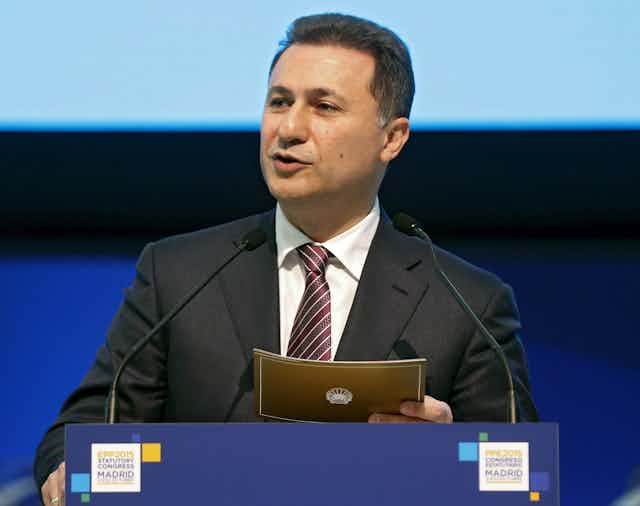There was a time when Macedonia looked like the poster-child of successful anti-corruption in the Balkans. The country’s scores in the various corruption indices were improving and a nuanced anti-corruption infrastructure appeared to be developing.
No longer. After a slew of corruption allegations in 2015, an EU-orchestrated deal has helped push the country’s prime minister, Nikola Gruevski, to promise to resign. A success for the EU? Of sorts, but the 28 member block still needs to do plenty of thinking about how it goes about trying to persuade prospective and current members to tackle corruption.
Macedonia is a young democracy. Independent since 1991 and a member of the UN since 1993, it is a country that has spent two decades trying to find its political feet. The country is not alone in experiencing problems along the path to democracy, but an ongoing dispute with Greece over the use of the name Macedonia and a political system where power is heavily concentrated in a relatively closed group of elites has done little to help.
Nevertheless, by March 2004, Macedonia was doing well enough to apply for membership of the EU and in December 2005 the country was offered candidate status. For a period afterwards many things improved –initial EU Progress Reports in this area noted that the government appeared to be both taking political corruption seriously and trying tentatively to do something about it.
Things fall apart
But a decade later, Macedonia lurches from one corruption-induced crisis to the next. In February 2015, Gruevski’s political opponents began releasing covertly recorded tapes revealing that members of the governing party appeared to be exerting undue influence on the judiciary and public administration – as well as the media.
They have also revealed evidence suggesting that the governing party has rigged election results. Indeed, the tapes indicated that the prime minister and several of his allies (predominantly ministers and MPs) apparently had strong and consistent control over most public institutions.
There was also the suggestion that the interior ministry had been party to the alleged cover-up of the death, at the hands of police, of a young demonstrator on election night in 2011.

The ensuing crisis has done little to help Macedonia’s aspirations to join the EU. In the summer of 2015 the EU nonetheless managed to broker a deal between the various parties – the so-called “Prizno agreement”.
The two main outcomes of the Prizno agreement are that elections must be held by April 24, 2016 and that the prime minister much resign at least 100 days prior to this – by January 15 2016. The other is the establishment of a special prosecutor’s office with the sole purpose of investigating and prosecuting corruption allegations that stemmed from the tapes.
But the process appears to have run into problems. The special prosecutor has since been appointed, but she has faced strong opposition and has been effectively denied the resources promised to her under Prizno.
Meanwhile the election of the secretary general of the State Election Commission (which will oversee the mechanics of the forthcoming poll), only took place on January 4, 2016, a good two months later than planned, and opposition parties have complained that the commission won’t be able to organise a free and fair election in time.
For its part, the ruling party, VMRO DPMNE, has announced that if the April 24 election is postponed (which is a distinct possibility) then this will be taken as an indication that the Prizno Agreement has failed and Gruevski will not resign. Neither he nor his party will then seek to fulfil its requirements.
The situation is a mess. And, as things stand, it is anything but clear how this particular episode will end.
Tragic farce
This is a tragedy not just for the Macedonians who have to live in what is tantamount to an ongoing soap opera, but also for the EU. And there are subsequently clear lessons that the EU needs to learn both in terms of how it seeks to tackle corruption and how it encourages prospective member states to move forward in this area.
The EU was expected to be the main driving force for positive reforms in Macedonia, but the accession process has been well and truly stalled. The EU has been unable to offer positive incentives for Macedonian politicians to undertake reforms which has given political elites an excuse to maintain the status quo and the corrupt practices that have served them well.
VMRO DPMNE has held power in Macedonia for almost a decade. The opposition is weak and has been able to do very little to stop – or even draw attention to – a host of regressive trends in a range of areas of which corruption is just one.
If the EU wants to influence and maintain positive trends in the fight against corruption in Macedonia, or indeed any country that is seeking to join, then it needs to provide relevant incentives for reform. After 10 years as a candidate member, Macedonia’s leaders have rationalised that the EU is not serious about letting the country in. Macedonian elites have subsequently shown little interest in undertaking reforms that would be manifestly against their own (economic and political) interests. Only with the events of 2015, and the release of the telephone tapes, have we seen anything resembling an impetus for change.
With no compromise in sight with Greece over the name of the country, the EU is in an impossible position. Turkeys, as they say, don’t vote for Christmas – and expecting Macedonia’s bickering politicians to undertake reform is fanciful. Reform takes place when interested parties have an interest in undertaking it – and in this case that means finding a path towards Macedonian membership of the EU. Even then, a whole host of challenges will remain, but there will at least be the prospect of change taking place. Eventually.

